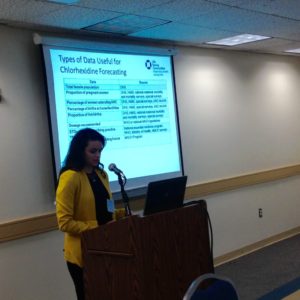On March 4, SIAPS Program technical staff presented at the 15th Global Health Mini-University, a one-day learning forum for professionals and students in the field of global health. Hosted by USAID, the George Washington University Milken Institute School of Public Health, and the Global Health Professional and Organizational Development Program, the event featured more than 60 sessions covering a broad range of topics.

The first SIAPS session provided an overview of a recently published quantification guide, developed by SIAPS and John Snow, Inc. (JSI) to facilitate better forecasting of life-saving commodities for reproductive, newborn, maternal, and child health (RMNCH). Following an introduction of the guide’s main elements, SIAPS Technical Advisor Reem Ghoneim and JSI Technical Advisor Jane Feinberg walked the audience through a forecasting exercise. The session highlighted the importance of better forecasting and sound data for increasing access to essential medicines and supplies.
In the afternoon, SIAPS Principal Technical Advisor Jane Briggs discussed the program’s work in strengthening pharmaceutical management within an integrated community case management (iCCM) context. Her presentation addressed the importance of good pharmaceutical systems governance, the need for reliable sources of information on medicines use and consumption, and the role of community health workers in ensuring proper use and management of medicines.
A second afternoon session featured work from the SIAPS tuberculosis team, presented by SIAPS Principal Technical Advisor for TB Chinwe Owunna and Senior Technical Advisors Antonia Kwiecien and Dumebi Mordi. Their presentation offered an overview of health systems -strengthening approaches to introducing new medicines and regimens for treating drug-resistant TB infections. In particular, they highlighted the need to establish collaborative frameworks for the timely and rational introduction of new TB medicines that can ensure access to quality medicines and improve patient safety.
To see more picture from the event, visit our Facebook album.

